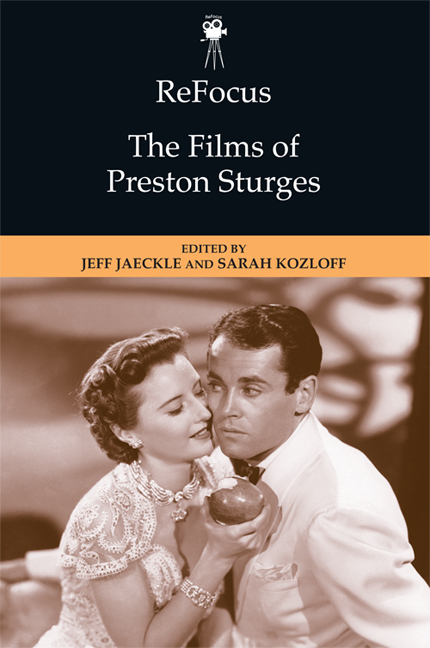Book contents
- Frontmatter
- Contents
- List of Figures
- Notes on Contributors
- Introduction: An Agile Mind—The Many Stands of Preston Sturges
- Part 1 Contexts: Genre, Studio, Authorship
- Part 2 Cultural Commentary: History and Identity
- Part 3 Technique: Scripting, Performance, Music
- 9 The Unheard Song of Joy
- 10 The Eye of the Storm: Preston Sturges and Performance
- 11 Presto(n) con Spirito: Comedies with Music, Sturges-style
- Part 4 Impact: Reception/Reputation
- Index
11 - Presto(n) con Spirito: Comedies with Music, Sturges-style
from Part 3 - Technique: Scripting, Performance, Music
Published online by Cambridge University Press: 05 September 2016
- Frontmatter
- Contents
- List of Figures
- Notes on Contributors
- Introduction: An Agile Mind—The Many Stands of Preston Sturges
- Part 1 Contexts: Genre, Studio, Authorship
- Part 2 Cultural Commentary: History and Identity
- Part 3 Technique: Scripting, Performance, Music
- 9 The Unheard Song of Joy
- 10 The Eye of the Storm: Preston Sturges and Performance
- 11 Presto(n) con Spirito: Comedies with Music, Sturges-style
- Part 4 Impact: Reception/Reputation
- Index
Summary
INTRODUCTION: UP WITH MUSIC
Well that sounds very deep dish and high falutin’.
—Coffee magnate J. B. Baxter in Christmas in JulyWhen we recall the great Hollywood comedies from the first two decades of the sound era, chances are we don't remember much about the music—unless it happens to play a role in the diegesis. In Bringing Up Baby (Hawks, 1938), for example, a memorable musical moment comes within a lengthy sequence set in the Connecticut woods at night, when the two leads, Susan and David (Hepburn and Grant), begin to sing the popular song “I Can't Give You Anything but Love (Baby).” They are trying to entice Susan's new pet, a leopard named “Baby,” down from a stranger's rooftop. Susan launches into the melody, and David joins her by harmonizing. But their duet turns into a cacophonous quartet when Baby starts to caterwaul and George, the story's pesky terrier, chimes in with strident barking.
I show this scene to my students to demonstrate how pointed such musical nonsense can be. It confirms our sense that Susan and David are destined to go through life, as the cliché has it, “making beautiful music together” (though “beautiful” is hardly an accurate descriptor of their performance). Notwithstanding all the trouble Susan has caused poor David, the scene shows how much fun their relationship has become. Most importantly, in an amusing way the performance of “I Can't Give You Anything But Love” reinforces its function as the film's “theme song.”
Written a decade before Bringing Up Baby was made, the song offered a comforting message to Depression-era audiences: one doesn't have to be rich to be happily in love. It's intriguing to note that the lyrics make light of the importance of money, and to surmise that the filmmakers might have chosen to feature it for this very reason, as a counterweight to the film's money-dependent plot. But even if for no more zany reason than to make a punning connection between the film's title and Susan's “baby,” the filmmakers frame the story with this song. Besides its performance as a hideous serenade, we hear it in two jazzy orchestral arrangements during the opening and closing credits.
- Type
- Chapter
- Information
- ReFocus: The Films of Preston Sturges , pp. 232 - 258Publisher: Edinburgh University PressPrint publication year: 2015



